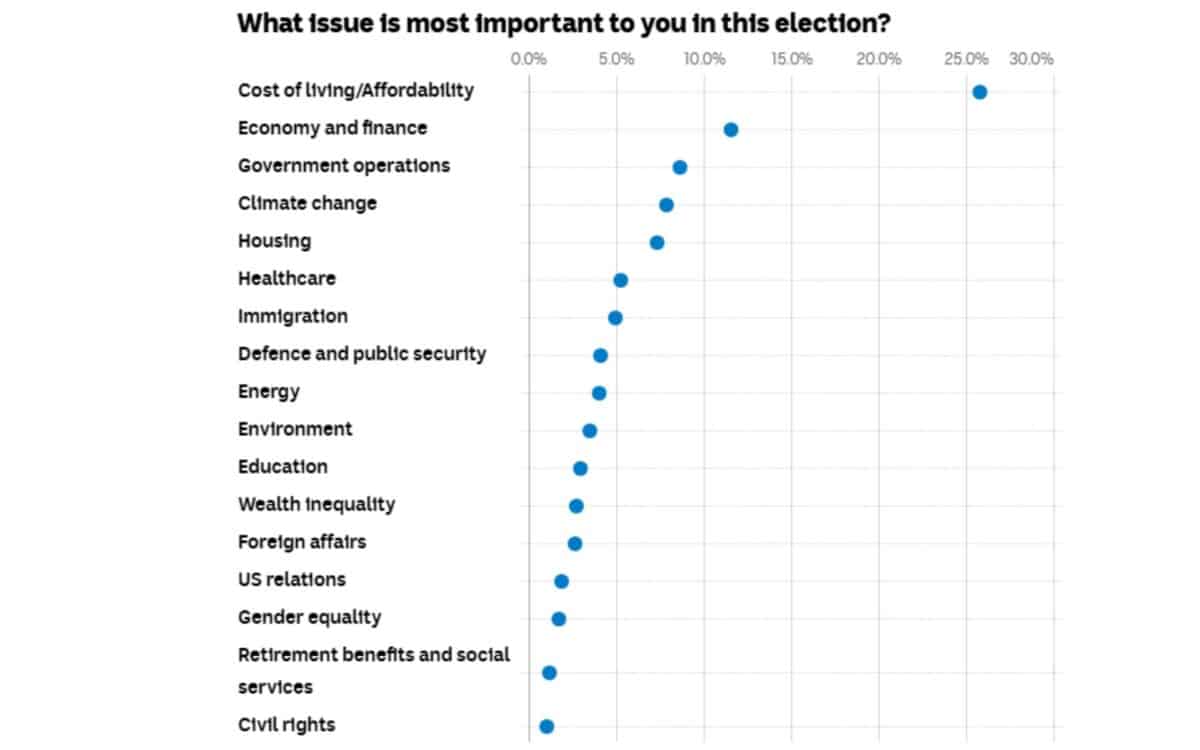The cost of living has quickly become the most urgent issue for Australian voters as the 2025 federal election draws near. Recent data from Vote Compass shows that one-quarter of respondents view rising costs, particularly for groceries and housing, as their primary concern.
The rising financial pressures, including inflation and skyrocketing rent prices, have shifted voter priorities, with many Australians struggling to make ends meet.
According to ABC News, this growing anxiety over affordability is reshaping political discourse, making economic issues central to the election. As the country faces these challenges, securing stable housing and managing day-to-day expenses are now top priorities for voters.
Cost of Living Tops Voter Concerns Across Demographics
The Vote Compass survey, which gathered responses from over 254,376 participants, revealed that cost of living is the leading issue for Australians regardless of their age, education, or political affiliation.
However, the concern is especially prevalent among those under 40 years old, a group increasingly burdened by housing and everyday expenses. For many, securing affordable housing has become a significant challenge. As Brisbane university student Maya Rawlinson explains, securing a rental property has been a struggle for her :

If we didn’t have the support of my mum and dad, it would definitely be much harder to find a rental – she said.
A lot of places, if you don’t have a certain amount in your bank account they won’t even consider you.
A Shift From Climate Change Concerns to Economic Pressures
In comparison to previous elections, the issue of climate change has taken a backseat in the minds of voters. While still important, the urgency surrounding climate action has been overshadowed by the immediate financial struggles many Australians face.
This shift is reflected in the data, with climate change dropping from being the primary concern in 2022 to now being secondary to the cost of living in terms of voter priorities. As Professor Katrina Lee Koo, political science expert at the University of Queensland, states :
It’s not necessarily the case that climate change is less important than it was as an issue in itself, but more that it’s been overtaken by the cost of living issue – she said.
The last election was fought during a kind of time of a type of cultural wars around climate change — I think we’ve partly moved on from that.
In fact, nearly half of all voters still consider global warming to be “extremely important”, reflecting the ongoing concern about environmental issues despite the economic pressure.
Political affiliation also plays a significant role in shaping voter concerns. Among Liberal-Coalition supporters, issues related to immigration and economic management are of greater importance, while Labor voters prioritize climate change and social equity.
Interestingly, those planning to vote for an independent candidate cite both cost of living and climate change as top priorities, reflecting a broader, more nuanced concern for national issues.
Regional and Generational Disparities in Housing Affordability
The impact of the cost of living, particularly housing affordability, is not uniform across the country. Rural and urban residents face distinct challenges, and there are growing concerns about the housing crisis affecting different age groups, especially women over 50, who have been increasingly represented in homelessness statistics. Professor Katrina Lee Koo emphasizes that these issues require targeted policies to address the specific needs of these vulnerable groups:
For instance, women in their 50s increasingly becoming a sort of noticeable homeless group in our country, so we have to ask questions about what kind of housing affordability packages are available for that particular group – she said.
As the election nears, it is clear that the cost of living will be a central theme in the political discourse, shaping both campaign strategies and policy proposals. Voters are looking for solutions that address their immediate financial concerns, while still considering the long-term implications of climate change and economic stability.
Key Policy Areas for Both Parties
Both major political parties have outlined key policies regarding Australia’s energy transformation, which is part of the larger climate change debate. According to Professor Lee Koo, energy policy is one area where the parties show notable differences :
I think that is a major policy for both parties, and it’s one of the few policy areas where we’re seeing a major difference – she said.
As voters navigate these competing concerns, cost of living will remain the dominant issue on their minds, influencing their votes and shaping Australia’s future policy direction.









